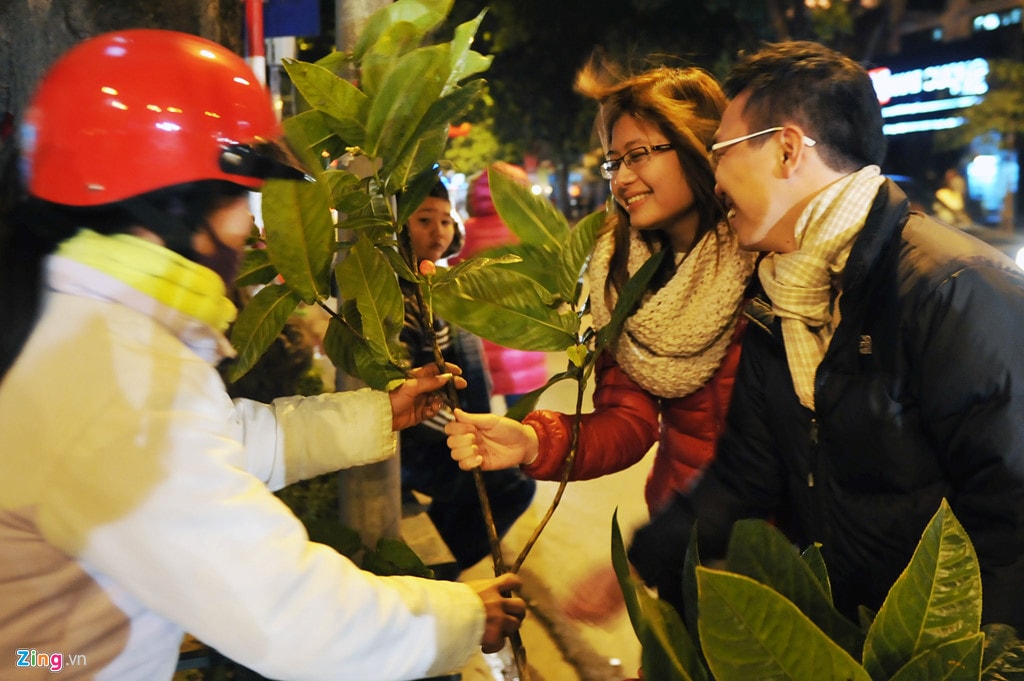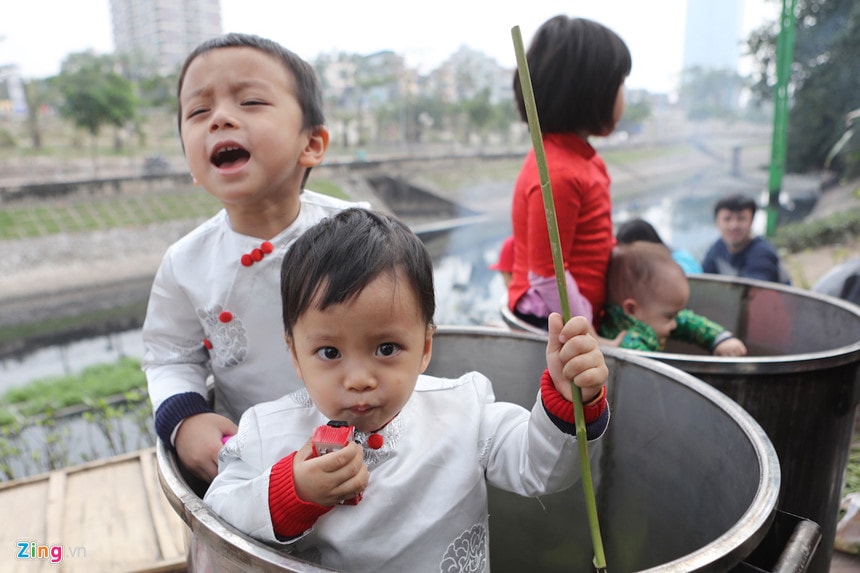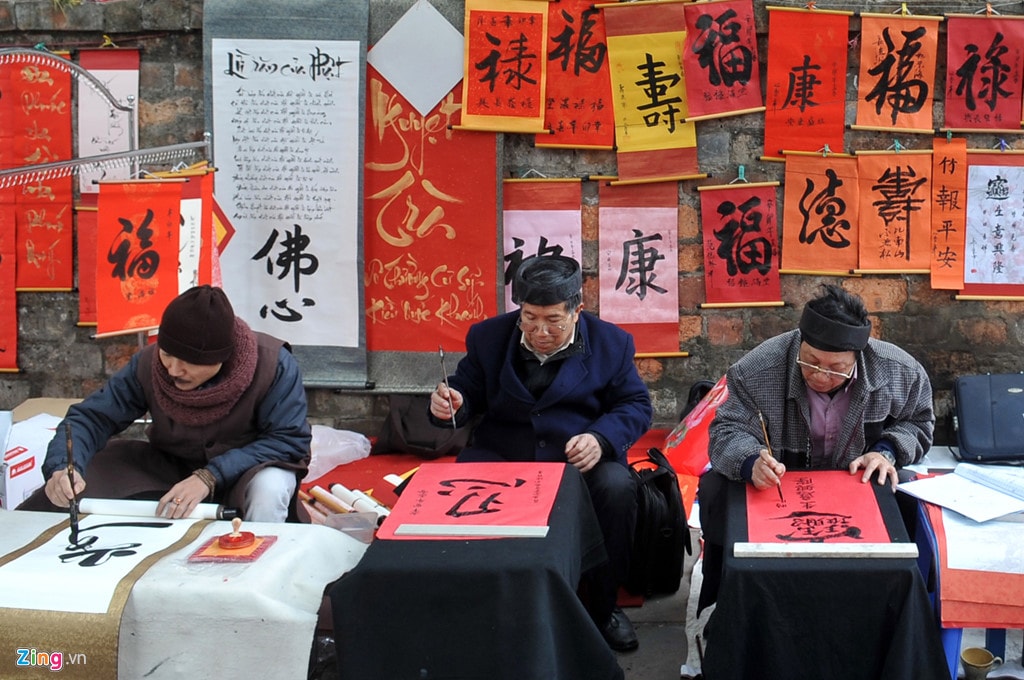Going out at the beginning of the year and indispensable customs during Tet
Picking lucky branches, entering the house first, going out, wishing a happy new year... are indispensable customs during Tet of the ancient Vietnamese people. These are cultural values that Vietnamese descendants have preserved to this day.
1. Picking luck
Vietnamese people have the custom of picking lucky branches. When returning from a ceremony on the 30th night of Tet, they pick a branch or flower (called lucky branches) to put on the door or in the incense burner on the altar to ask for luck from heaven, Buddha, gods, and saints.
Lucky branches are usually banyan, bodhi, and ficus branches in front of communal houses, temples, pagodas, and shrines. These trees are long-lived, so people hope that the blessings given by heaven, Buddha, gods, and saints will last as long.
|
| Buy fortune to bring home right after New Year's Eve. Photo:Yellow River. |
2. Incense
Many people, when going to the temple, instead of picking branches, ask for luck by burning a stick of incense or a small bundle of incense, standing and praying in front of the altar. Then they bring the incense back to place on the family altar or the altar of Tho Cong.
Fire symbolizes prosperity. Bringing fire from places of worship means asking for blessings from Buddha and saints to bless business prosperity all year round.
While carrying incense from the place of worship back, if the wind blows and the incense catches fire, it is considered a good omen, predicting good luck all year round.
3. Housewarming
The ancient Vietnamese believed that on the first day of the new year, if a cheerful, easy-going, and kind person comes to the house first, then everything in the house will be smooth and easy all year long. However, if a harsh, cruel, or foolish person comes to the house first, then the whole year will be filled with trouble, difficulties, or many unpleasant surprises.
Therefore, ancient people often asked people to enter their house as they wished. In many places, people often enter their own house after visiting pagodas, temples, and shrines on the 30th night of Tet. At that time, the most virtuous person will enter the house first.
|
| During Tet, Vietnamese children are often very happy because they get to wear new clothes and receive lucky money. Photo:Vu Minh Quan. |
4. Departure
Going out means going out, out of the gate, out of the village where you live, wherever you go, whatever you do. At the beginning of the year, people often choose a good day and time to go out and a favorable direction with the purpose of praying for luck all year round.
Vietnamese people also have a custom that during the three days of Tet, no matter where they go, they must return home by evening. The meaning of this custom is to avoid going out and not returning, which will bring bad luck to the whole family.
5. Happy New Year
In the countryside, on the first day of Tet, there is a custom of giving New Year greetings at the village communal house, followed by New Year greetings from the village, hamlet, and professional and trading groups. After that, people return home to prepare for their family's New Year.
In families, early on the first day of Tet, after worshiping their ancestors and the Land God, children and grandchildren wish their grandparents and parents a happy new year. The elders sit in the church so that their children and grandchildren can come and pay their respects and wish them a happy new year. At this time, everyone dresses formally with their best clothes for Tet.
When wishing their ancestors a Happy New Year, children and grandchildren often present them with a Tet gift (cakes) or a sum of money in a pink envelope. This money is called the first money of the year, bringing them luck all year round.
After listening to New Year wishes, the elders also wish good things in return and give lucky money to their children and grandchildren so that they will have good luck and prosperity.
In addition, during the Tet holidays, people often visit relatives and neighbors to wish them prosperity. When they meet, the old year's grudges are almost gone, everyone is warm and wishes others what they wish for.
6. Lucky money
The Vietnamese custom of giving lucky money during Tet has existed since ancient times. Lucky money is usually put in pink envelopes with small change, with the meaning that the money will multiply and bring luck to the descendants.
Lucky money is also called lucky money. Friends often give lucky money to each other to wish for prosperity. People often save that money for good luck.
In the South, giving lucky money to children is called li xi.
During Tet, in addition to grandparents and parents, adults in the family also give lucky money to the children. In addition, children who follow adults to other houses to celebrate Tet and wish them a happy new year are also given lucky money by the host so that they will eat well, grow up quickly, study well, be smart, healthy and obedient.
|
| Asking for calligraphy at the beginning of the year is an interesting cultural feature of Vietnamese people. Photo:Yellow River. |
7. Holidays
The custom of going to Tet festival originates from the Vietnamese people's ancestor worship. They worship their own ancestors and also respect the ancestors of others.
In the countryside, people visit each other's houses on Tet not only to wish each other a happy new year like urban people, but the main thing is to celebrate Tet.
When going to a Tet holiday, people must wear neat clothes and a headscarf because dressing sloppily is disrespectful to the invisible beings on the altar and the host of the house who comes to celebrate Tet. At each house, people going to a Tet holiday must bow four times and bow three times before the family altar, then wish a happy new year.
8. Hospitality
Vietnamese people have always been hospitable, and this spirit is even more evident during Tet.
Every visitor to the Tet holiday is warmly welcomed by the host. After the guests pay respect to the host's ancestors, they are invited to eat betel and drink water, which they cannot refuse because doing so will bring bad luck to the host's family. The host invites guests to taste the cake and says it is delicious, which is considered a good omen.
9. Opening the pen
On the occasion of Tet, scribes and teachers often choose an auspicious day and time to start writing with a poem or parallel sentences. These poems and parallel sentences are read to each other and then recited together when guests come to celebrate Tet.
Students also take this opportunity to choose an auspicious time to start writing to pray for progress in their studies and success in exams.
10. Carrying water at the beginning of the year
On the first day of Tet, in the countryside and cities, poor people often carry water from the village well to houses and receive a large sum of money.
This first water haul of the year is warmly welcomed by every family, even if there is no shortage of water in the house. People believe that if someone brings water to the house at the beginning of the year, wealth will flow in like water all year round.
In addition, in many villages, on the first morning of Tet, men go to houses to wish New Year's greetings, carrying pieces of red paper with "Nhat ban van loi" (one capital, ten thousand profits) or "Dai cat" written on them as gifts to the homeowner and receive a sum of money in return. This custom has the same meaning as the custom of carrying water at the beginning of the year.




